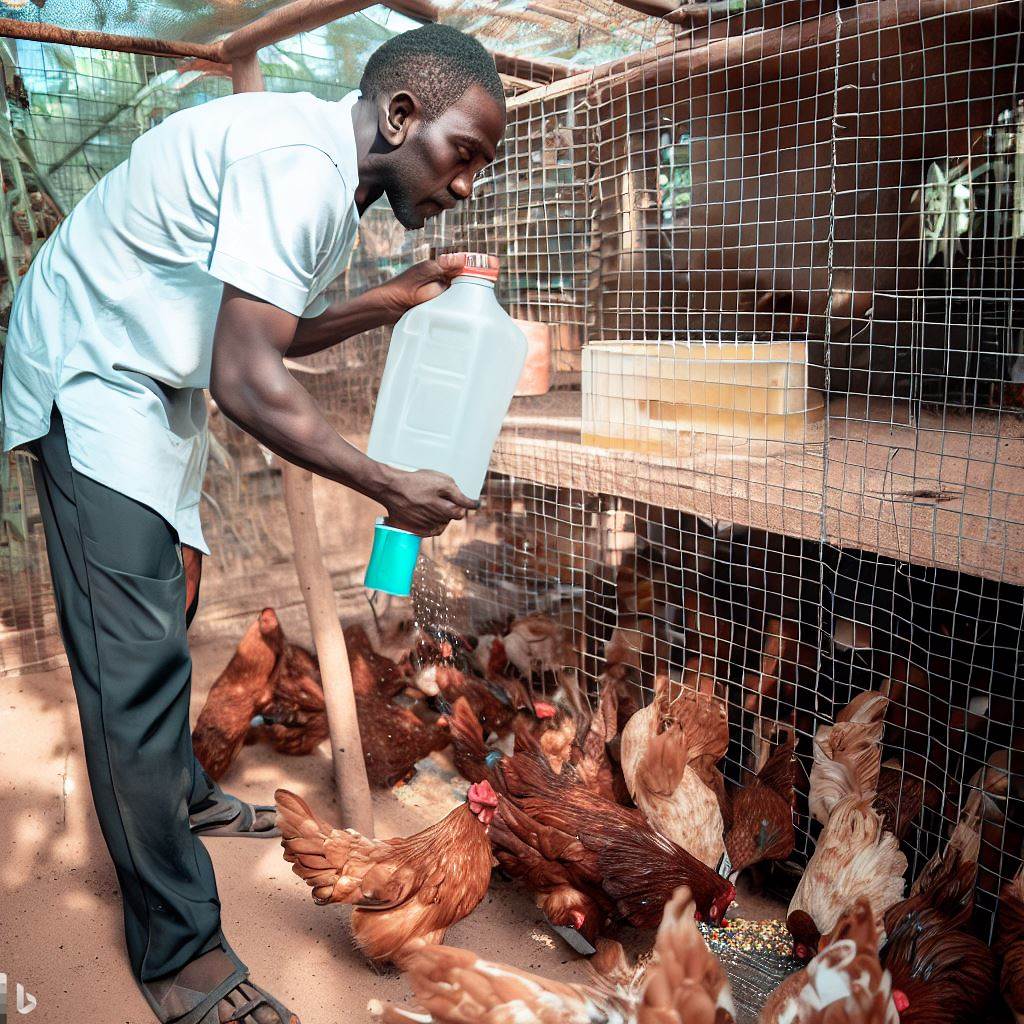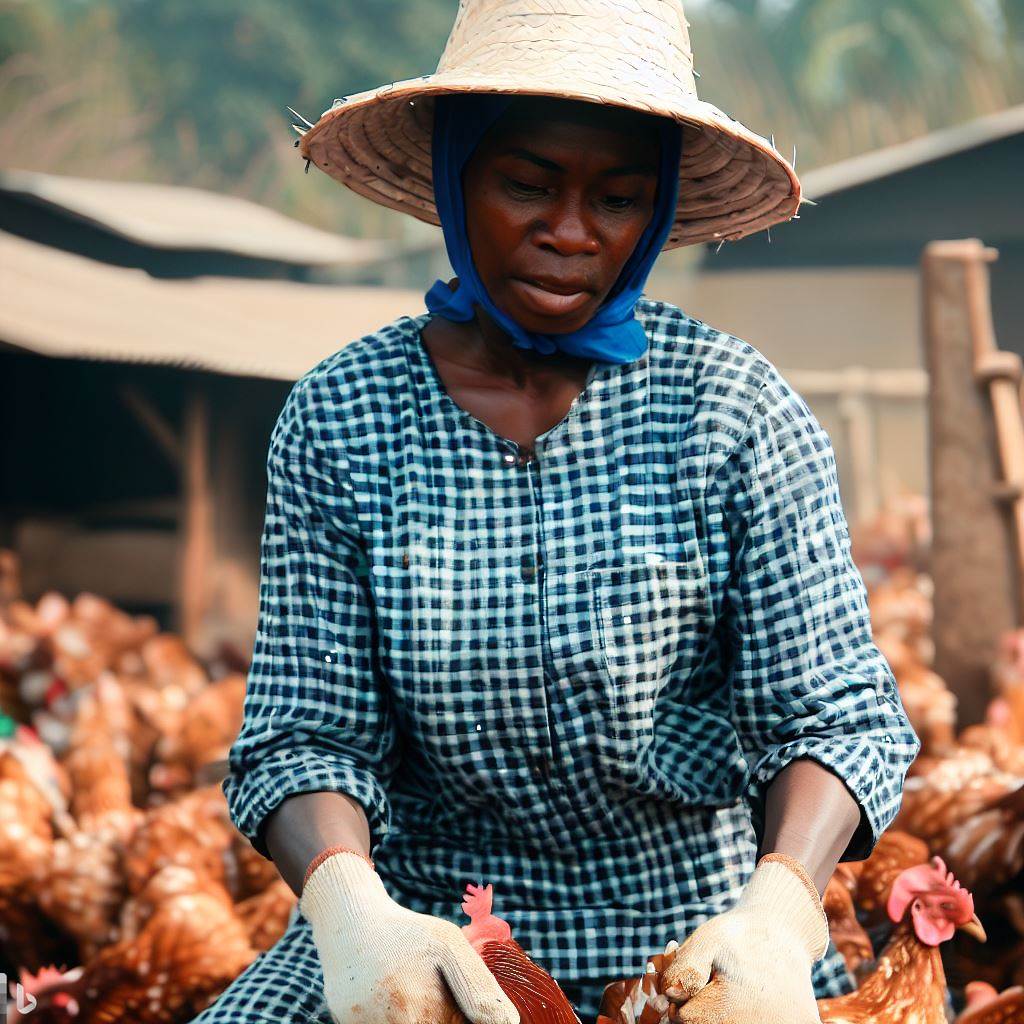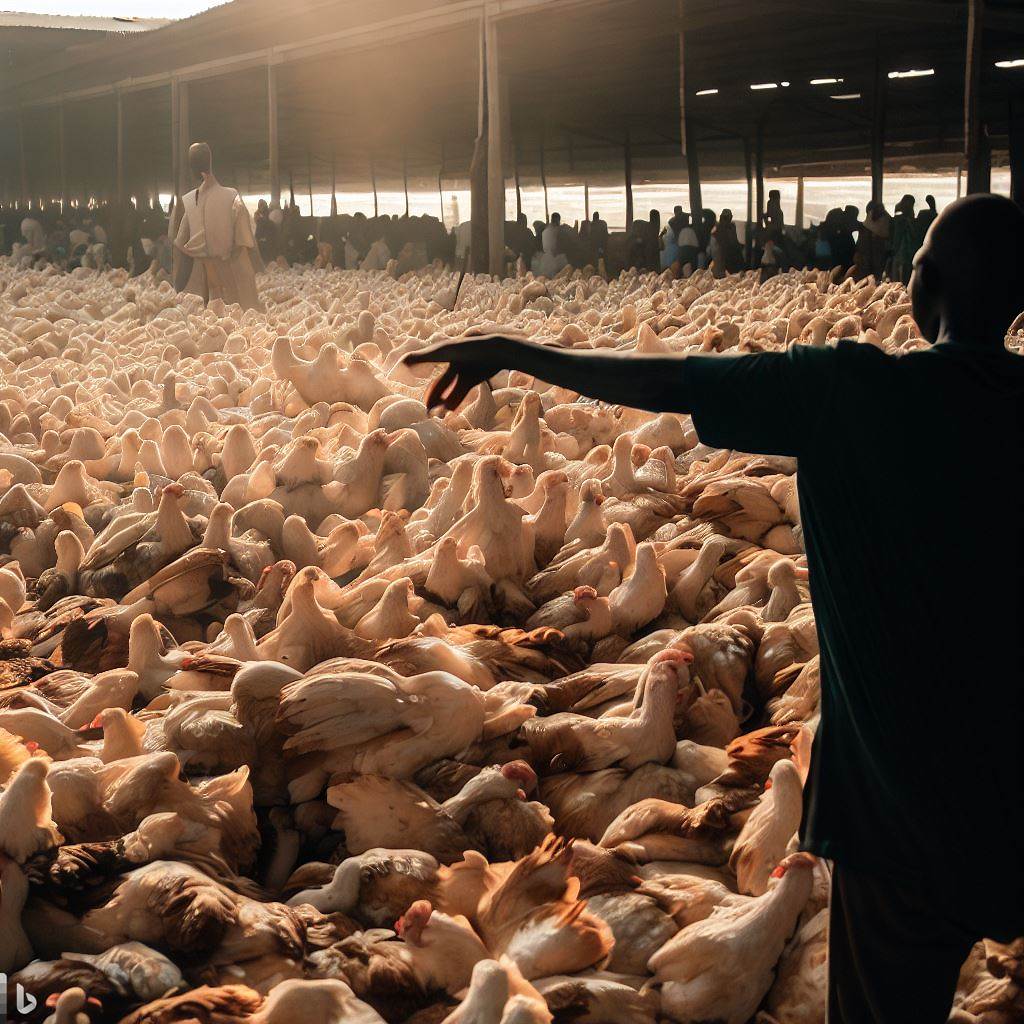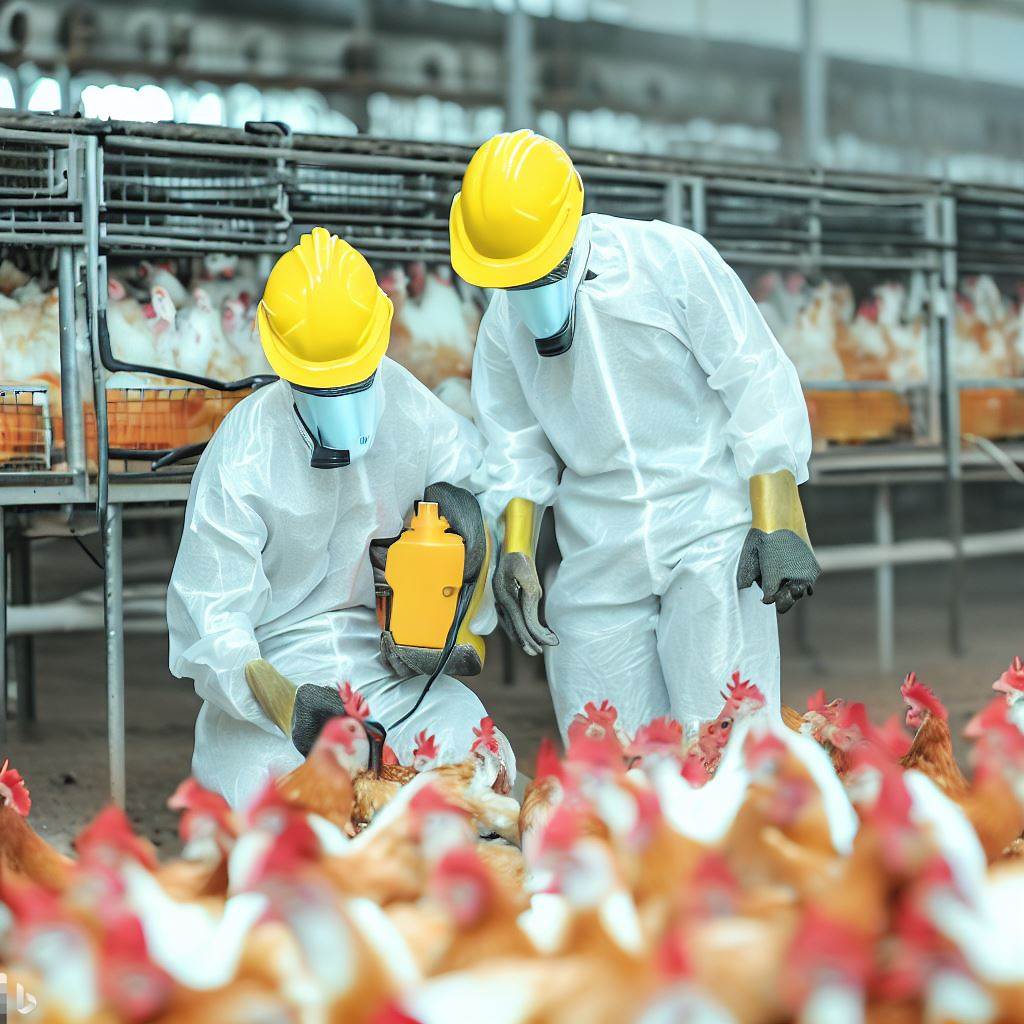Introduction
Sustainable practices for poultry producers in Nigeria play a vital role in promoting a thriving poultry industry.
It is crucial to adopt sustainable practices to ensure environmental conservation, economic stability, and social responsibility.
This blog post aims to explore the significance of sustainable practices for poultry producers in Nigeria and provide insights into the benefits they offer.
Challenges in the Nigerian Poultry Industry
- The Nigerian poultry industry faces numerous challenges that hinder its growth and development.
- One of the major challenges is the high cost of production, including feed costs and infrastructure expenses.
- Poultry producers also struggle with diseases and infections, which can lead to significant economic losses.
- Poor biosecurity practices and inadequate disease control measures exacerbate the risk of disease outbreaks.
- Another challenge is the lack of access to quality inputs such as vaccines, medications, and quality breeds.
- Inadequate knowledge and training on modern poultry management practices hinder productivity and profitability.
- The inconsistent and unreliable electricity supply in Nigeria poses a challenge to poultry operations.
- Transportation and logistics problems make it difficult to distribute poultry products on time and maintain their quality.
Environmental Impact and Sustainability Issues
- Poultry production has a significant environmental impact due to its contribution to greenhouse gas emissions.
- The improper disposal of poultry waste leads to water and soil pollution, affecting local ecosystems.
- Massive deforestation is a consequence of clearing land for poultry feed production, resulting in habitat loss.
- Excessive water consumption in poultry farms contributes to water scarcity in certain areas.
- The use of antibiotics and hormones in poultry production raises concerns about food safety and antibiotic resistance.
- Energy-intensive practices in poultry farming contribute to carbon emissions and climate change.
Need for Sustainable Practices
- Sustainable practices are necessary in the Nigerian poultry industry to address these challenges and promote long-term viability.
- Implementing biosecurity measures can help prevent the spread of diseases and reduce economic losses.
- Proper waste management systems, such as composting, can minimize environmental pollution from poultry waste.
- Investing in research and development can improve breed selection for disease resistance and productivity.
- Training programs and knowledge sharing platforms can enhance poultry management practices in Nigeria.
- Renewable energy sources like solar power can provide a reliable and sustainable energy supply for poultry farms.
- Promoting efficient transportation and logistics systems can ensure timely delivery and reduce product spoilage.
- Encouraging sustainable feed production methods, such as using alternative protein sources, reduces deforestation and habitat loss.
- Implementing strict regulations and monitoring systems can ensure the responsible use of antibiotics and hormones in poultry production.
By adopting sustainable practices, Nigerian poultry producers can overcome challenges, minimize their environmental impact, and contribute to a more sustainable and profitable industry.
Benefits of Sustainable Practices
- Increased profitability and efficiency: Adopting sustainable practices can lead to higher profits and improved efficiency for poultry producers.
- Reduced waste and cost savings: Sustainable practices, such as proper waste management and resource conservation, can minimize waste and save on costs.
- Enhanced animal welfare: Implementing sustainable practices can improve the overall well-being of poultry, leading to healthier and happier animals.
- Improved product quality: Sustainable practices, including organic feed and natural growth methods, can result in higher-quality poultry products.
- Market access and consumer demand: Many consumers are increasingly interested in sustainably produced food, providing a market advantage for poultry producers.
- Long-term viability and resilience: By adopting sustainable practices, poultry producers can ensure the long-term viability and resilience of their operations.
- Reduced environmental impact: Sustainable practices reduce pollution, minimize soil degradation, and preserve natural resources, contributing to environmental conservation.
- Positive public health impact: Sustainable practices promote safe and healthy production methods, reducing the risk of foodborne illnesses and improving public health.
- Compliance with regulatory requirements: Sustainable practices often align with government regulations and standards, ensuring compliance and avoiding penalties.
- Enhanced reputation and brand image: Poultry producers practicing sustainability gain a positive reputation and build a strong brand image in the market.
Embracing sustainable practices yields multifaceted benefits for poultry producers.
Enhanced profitability and efficiency are achieved through streamlined waste management and resource conservation.
Improved animal welfare, including better living conditions and natural growth methods, enhances product quality.
Meeting the growing demand for sustainable food grants a competitive market edge, while environmental conservation through reduced pollution safeguards future generations.
Adherence to regulatory standards avoids penalties. Such practices cultivate a positive reputation and brand image as consumers increasingly favor sustainability.
In Nigeria, these sustainable practices are pivotal for enduring success in the poultry industry, aligning economic gains with environmental stewardship and animal welfare.
Sustainable Feeding Strategies
In order to ensure a sustainable poultry production system in Nigeria, it is crucial for poultry producers to implement effective feeding strategies.
These strategies play a significant role in the overall well-being and productivity of the poultry, as well as the environmental impact of the industry.
Let’s explore the importance of sustainable feeding strategies and the various options available for poultry producers.
Importance of Sustainable Feeding Strategies
Sustainable feeding strategies are essential for poultry producers in Nigeria due to several reasons.
Firstly, these strategies help in maintaining the health and welfare of the birds.
By providing a balanced and nutritious diet, producers can ensure optimal growth and development, disease resistance, and overall wellbeing of the poultry flock.
Secondly, sustainable feeding strategies contribute to the reduction of environmental impact.
By utilizing locally sourced feed ingredients, poultry producers can minimize the carbon footprint associated with importing feed.
This not only decreases the reliance on imported feed but also supports local farmers and reduces transportation costs and emissions.
Furthermore, sustainable feeding strategies promote the efficient use of resources.
By optimizing feed conversion ratios and minimizing wastage, poultry producers can maximize the productivity and profitability of their operations.
This entails utilizing feed that is easily digestible, nutrient-rich, and sufficient in quantity.
Locally Sourced, Organic, and Non-GMO Feed Options
Poultry producers in Nigeria have a range of feed options that align with sustainability principles. One such option is sourcing feed ingredients locally.
By utilizing locally available grains, seeds, and legumes, producers can support the domestic agricultural sector, reduce transportation distances, and ensure fresher and more wholesome feed for their poultry.
In addition, organic feed options are gaining popularity among sustainable poultry producers.
Organic feed refers to feed that is free from synthetic chemicals, pesticides, and genetically modified organisms (GMOs).
By opting for organic feed, producers can meet consumer demands for healthier and more environmentally friendly poultry products, enhancing market competitiveness.
Non-GMO feed is another sustainable feeding strategy that eliminates genetically modified ingredients.
This is particularly relevant as many consumers in Nigeria and worldwide prefer GMO-free products.
By offering non-GMO poultry products, producers can cater to these preferences and tap into niche markets that prioritize sustainable and natural production methods.
Benefits of Feed Efficiency and Reducing Reliance on Imported Feed
Feed efficiency is a critical aspect of sustainable feeding strategies for poultry producers.
Improving feed efficiency ensures that the poultry receives optimal nutrition from the feed, minimizing waste and resource consumption.
This leads to improved growth rates, reduced feed costs, and ultimately, increased profitability.
Reducing reliance on imported feed has several advantages for poultry producers in Nigeria.
Firstly, it reduces the vulnerability to external market fluctuations, such as price increases and supply disruptions.
By utilizing locally sourced ingredients and optimizing on-farm feed production, producers can have greater control over their feed supply and costs.
Furthermore, reducing imported feed supports the national economy by promoting self-sufficiency.
By relying less on imported feed, Nigeria can strengthen its food security and reduce its dependence on foreign markets.
This contributes to overall economic stability while empowering local agricultural communities.
In fact, sustainable feeding strategies are of utmost importance for poultry producers in Nigeria.
These strategies enhance the health and welfare of the poultry, minimize environmental impacts, optimize resource utilization, and boost overall profitability.
By utilizing locally sourced, organic, and non-GMO feed options, as well as improving feed efficiency and reducing reliance on imported feed, producers can contribute to a more sustainable and resilient poultry industry in Nigeria.
Waste Management and Resource Optimization
In order to promote sustainable practices for poultry producers in Nigeria, it is essential to focus on waste management and resource optimization.
The proper handling and disposal of poultry waste can help minimize environmental pollution and also offer several benefits in terms of resource reuse.
Sustainable Waste Management Practices
Implementing sustainable waste management practices is crucial for poultry producers in Nigeria.
This involves establishing effective systems to handle poultry waste and ensure its proper disposal. Some key practices include:
- Separating different types of waste to facilitate recycling and reuse.
- Designating specific areas for waste storage to prevent contamination of land and water sources.
- Implementing regular cleaning and maintenance of waste storage areas to prevent foul odors and disease transmission.
- Regularly monitoring waste generation and disposal to identify areas for improvement.
Proper Handling and Disposal of Poultry Waste
Poultry waste, including manure and litter, contains high levels of nitrogen, phosphorus, and potassium, which can contaminate soil and water if not handled properly.
To minimize environmental pollution:
- Collect waste on a daily basis to prevent the accumulation of large quantities.
- Store waste in covered and lined pits to prevent leaching into groundwater.
- Compost waste to facilitate decomposition and reduce pathogen presence.
- Dispose of waste in designated areas or collaborate with local authorities for proper disposal.
Benefits of Reusing Waste
Reusing poultry waste can offer significant benefits in terms of resource optimization and environmental sustainability:
- Organic Fertilizer: Poultry waste is rich in nutrients, making it an excellent organic fertilizer. By composting or processing the waste, it can be transformed into nutrient-rich soil additives that improve crop productivity.
- Energy Production: Poultry waste can be converted into biogas through anaerobic digestion. This biogas can then be used for generating electricity or as a renewable energy source for heating and cooking.
- Reduced Cost: By reusing waste as fertilizer or for energy production, poultry producers can reduce the need for synthetic fertilizers and conventional energy sources, leading to cost savings.
- Environmental Protection: Proper waste management and resource reuse can help minimize water and soil pollution, safeguarding the environment and promoting sustainable agricultural practices.
Sustainable waste management practices and resource optimization are essential for poultry producers in Nigeria to minimize environmental pollution, maximize resource reuse, and contribute to a more sustainable agricultural sector.
By implementing these practices, poultry producers can reduce their environmental impact and achieve long-term economic benefits.

Energy Efficiency and Renewable Resources
In sustainable poultry production, energy efficiency plays a vital role in ensuring the long-term viability of the industry.
Significance of Energy Efficiency
Energy efficiency is crucial for sustainable poultry production as it reduces energy consumption and minimizes environmental impacts.
- Effective energy management practices lower operating costs, increasing profitability for poultry producers.
- By optimizing energy efficiency, producers can reduce carbon emissions and their overall environmental footprint.
- Implementing energy-saving measures helps mitigate climate change and promotes a healthier planet.
Renewable Energy Alternatives
Exploring renewable energy sources offers a sustainable solution to meet the growing energy demand in the poultry industry.
- Solar panels are an excellent option for poultry farms in Nigeria due to the country’s abundant sunshine.
- Installing solar panels allows poultry producers to generate clean energy, reducing their reliance on fossil fuels.
- Biogas systems harness the power of organic waste and convert it into renewable energy for heating and electricity.
- By utilizing renewable energy alternatives, poultry producers can reduce their dependence on traditional energy sources.
Benefits of Reducing Energy Consumption
Minimizing energy consumption in the poultry industry brings several advantages for both the environment and the industry as a whole.
- Lower energy consumption reduces operating costs and improves the overall financial performance of poultry farms.
- Increased energy efficiency reduces greenhouse gas emissions, contributing to a cleaner and healthier environment.
- Reducing energy consumption promotes sustainable resource management and helps conserve finite energy resources.
- Poultry producers can enhance their public image by adopting sustainable practices and appealing to environmentally conscious consumers.
- By reducing their environmental footprint, poultry producers also contribute to the United Nations’ Sustainable Development Goals.
In short, energy efficiency in sustainable poultry production is of utmost importance.
Adopting energy-saving measures, exploring renewable energy sources, and reducing energy consumption not only benefit the environment but also enhance the long-term viability and profitability of the poultry industry in Nigeria.
By embracing sustainable practices, poultry producers can create a greener future and contribute to a healthier planet for generations to come.
Read: The Journey to Becoming a Poultry Producer in Nigeria
Water Conservation and Efficient Use
Importance of water conservation in poultry production
In poultry production, water conservation is of paramount importance for several reasons.
- Conserving water in poultry farms helps reduce overall water consumption and minimize water waste.
- Efficient water use contributes to sustainable practices, reducing the environmental impact of poultry production.
- Water scarcity is a growing concern globally, and responsible water use is essential to ensure its availability for future generations.
Techniques for efficient water use, such as using automated systems and water recycling
Various techniques can be employed to achieve efficient water use in poultry production:
- Implementing automated watering systems is an effective method to control and optimize water consumption.
- These systems provide poultry with enough water while avoiding unnecessary wastage.
- Using nipple drinkers or water troughs with properly adjusted flow rates can also promote efficient water use.
- Regular maintenance and inspection of the watering systems ensure their optimal functionality.
- Water recycling should be explored as a means of reducing water consumption and minimizing waste.
- Efforts can be made to collect and treat water from poultry house runoff or used water for subsequent reuse.
Benefits of implementing water-saving practices
Implementing water-saving practices in poultry production offers numerous benefits:
- Reduced water consumption leads to cost savings for poultry producers.
- Conserving water resources contributes to the sustainability and long-term viability of the poultry industry.
- Water-saving practices help minimize the ecological impact associated with poultry production.
- Improved water management enhances the overall efficiency and productivity of poultry farms.
- Less wastewater generation reduces the burden on water treatment facilities and the environment.
- Implementing water-saving initiatives demonstrates social responsibility and enhances the reputation of poultry producers.
It is crucial for poultry producers in Nigeria to prioritize water conservation and efficient use.
By adopting advanced techniques and implementing sustainable practices, poultry farmers can contribute to a more environmentally responsible industry.
Additionally, government support and incentives for water conservation initiatives would foster widespread adoption of such practices.
The collective efforts of poultry producers can lead to significant water savings, ensuring the long-term sustainability of Nigeria’s poultry industry.
Read: Top Challenges Faced by Nigerian Poultry Producers
Delve into the Subject: Overcoming Common Diseases in Nigerian Poultry Farms
Animal Welfare and Ethical Considerations
How Sustainable Practices Positively Impact Animal Welfare in Poultry Production
- Promotes a healthy environment for poultry, reducing stress and improving their overall welfare.
- Encourages the use of natural and organic feed, ensuring nutritious and balanced diets for the birds.
- Reduces the risk of diseases and infections, leading to a better quality of life for the poultry.
- Incorporates proper housing systems that provide adequate space and ventilation, allowing the birds to exhibit natural behaviors.
- Implements strict biosecurity measures to prevent the spread of diseases, protecting both poultry and human health.
- Reduces pollution through proper waste management, minimizing negative impacts on the environment and wildlife.
- Employs humane slaughtering methods that prioritize minimal pain and distress to the animals.
- Promotes the use of alternative and sustainable energy sources, minimizing carbon emissions and environmental degradation.
The Concept of Raising Chickens in Humane Conditions and Providing Proper Care
- Ensures chickens have access to clean water, suitable shelter, and sufficient space for movement.
- Allows chickens to exhibit natural behaviors, such as scratching, perching, and dust bathing.
- Provides appropriate lighting conditions that mimic natural daylight patterns, promoting their well-being.
- Offers comfortable bedding materials that allow for proper insulation, cushioning, and dust reduction.
- Promotes the use of natural remedies and preventive measures instead of relying heavily on antibiotics.
- Regularly monitors and addresses the health and welfare needs of the chickens through proper veterinary care.
- Ensures chickens are handled gently and with care during all management practices, minimizing stress and injuries.
- Maintains a healthy and balanced flock population to prevent overcrowding and maintain optimal welfare conditions.
Increasing Consumer Demand for Ethically Produced Poultry Products
- Consumers are becoming more aware of the ethical implications of their food choices and, therefore, demand ethically produced poultry products.
- They consider animal welfare as a crucial factor in their purchasing decisions, supporting producers who prioritize it.
- Sustainable practices in poultry production align with the values and preferences of environmentally conscious consumers.
- Ethical poultry production ensures transparency, traceability, and accountability, fostering trust with consumers.
- Certifications and labels indicating ethical standards help consumers make informed choices when buying poultry products.
- Retailers and restaurants are increasingly sourcing poultry products from ethically managed farms to meet consumer demand.
- Consumers are willing to pay a premium for ethically produced poultry products, driving market incentives for sustainable practices.
- Ethical poultry production enhances the brand image and reputation of producers, attracting loyal and conscious consumers.
By implementing sustainable practices in poultry production, we not only positively impact the welfare of animals but also meet the growing consumer demand for ethically produced poultry products.
Prioritizing animal welfare and ethical considerations is not only a responsibility but also a strategic choice for the long-term success of poultry producers in Nigeria.
Read: Effective Strategies for Poultry Production in Nigeria
Explore Further: The Rise of Livestock Production in Nigeria: A Detailed Analysis
Government Policies and Support
When it comes to sustainable poultry production, Nigeria has implemented several government policies and regulations to ensure that producers follow sustainable practices and minimize their environmental impact.
- The Nigerian government has issued guidelines for poultry producers to follow, which include the proper handling and disposal of waste from poultry farms.
- These guidelines also outline the use of organic and environmentally friendly feed options for poultry, promoting sustainability in the industry.
- Nigeria has established regulations regarding the use of antibiotics and other veterinary drugs in poultry production to reduce the risk of antibiotic resistance and promote animal welfare.
Government support or initiatives promoting sustainable practices for poultry producers
In addition to regulations, the government has taken several initiatives to support and promote sustainable practices for poultry producers:
- Financial support is provided to poultry producers who adopt sustainable practices, such as installing waste treatment systems or transitioning to organic feed.
- The government has also set up training programs and workshops to educate poultry producers on sustainable practices and the benefits they bring to both the environment and their businesses.
- Research grants are offered to encourage studies and innovations in sustainable poultry production, with the aim of finding more efficient and eco-friendly methods.
Role of industry associations and collaborations in implementing sustainable practices
Industry associations and collaborations play a crucial role in implementing sustainable practices in the poultry sector:
- These associations work closely with the government to develop and update policies and guidelines for sustainable poultry production.
- They provide technical assistance and resources to producers, helping them adopt and implement sustainable practices effectively.
- Industry collaborations facilitate knowledge sharing and promote best practices among poultry producers, ensuring continuous improvement in sustainability efforts.
Collaborative initiatives between industry associations and poultry producers have resulted in the development of certification programs that recognize and incentify sustainable practices:
- These certifications act as badges of honor, proving that the producers are following sustainable practices and meeting set standards.
- By obtaining certifications, poultry producers gain a competitive edge in the market, attracting consumers who prioritize sustainability and ethical practices.
- The involvement of industry associations also ensures that poultry producers have a unified voice and can advocate for their needs and concerns regarding sustainable practices to the government.
In essence, the Nigerian government has implemented policies and regulations to promote sustainable practices for poultry producers, while also offering financial support and initiatives to encourage adoption.
Industry associations and collaborations further enhance the implementation of sustainable practices, providing guidance, resources, and certification programs.
Through these combined efforts, Nigeria’s poultry industry is making significant strides towards a more sustainable and environmentally conscious future.
Read: The Role of Technology in Nigeria’s Poultry Industry
Explore Further: The Role of Operations Managers in Nigeria’s Agricultural Revolution
Conclusion
Adopting sustainable practices for poultry production in Nigeria is of utmost importance.
These practices bring numerous benefits, not only for the environment but also for economic and social sustainability.
By implementing sustainable practices, poultry producers can minimize the negative impact on the environment.
This includes managing and reducing waste, optimizing energy efficiency, and conserving natural resources. These actions contribute to a cleaner and healthier ecosystem.
Furthermore, embracing sustainable practices is a wise economic decision.
They can lead to cost reductions through improved efficiency in resource use, such as feed, water, and energy.
Additionally, practices that promote animal welfare and health can enhance the overall productivity and quality of poultry products.
Social sustainability is also crucial in adopting sustainable practices. By prioritizing responsible production methods, poultry producers can build trust and credibility with consumers.
This can lead to increased demand for their products, as consumers are becoming more aware of the importance of sustainable practices.
In order to achieve long-term environmental, economic, and social sustainability, poultry producers must actively embrace these practices.
It is essential for them to integrate sustainable principles into their operations and continuously seek ways to improve their processes.
Therefore, I encourage all poultry producers in Nigeria to prioritize sustainability and adopt these practices.
By doing so, they not only contribute positively to the environment but also ensure a prosperous future for their businesses and the well-being of their communities.
Together, we can create a sustainable and thriving poultry industry in Nigeria.




